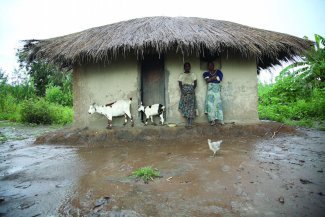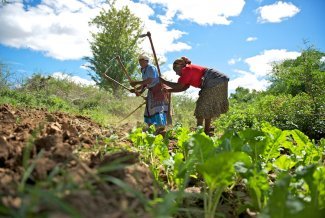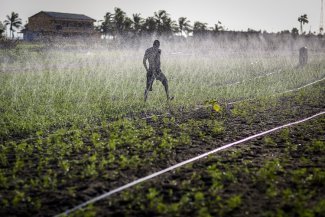
Women and children walk to safety in Blantyre on March 14 2023, following the landfall of Cyclone Freddy, which killed more than 1,000 people in Malawi, the epicentre of the disaster.
For the last two years, Jakina Lameki, who lives in the town of Bangula in Malawi’s southernmost district of Nsanje, has experienced the catastrophic impact that climate change is having on her country first-hand. Last year, Lameki’s maize, millet, bean and sweet potato crops were washed away by Cyclone Ana, and then another tropical cyclone, Gombe, totally destroyed her farmland.
Throughout the year, Lameki depended on humanitarian food assistance, but following a strong start to the growing season in November, she was hopeful that she would be able to feed herself and her family. However, Lameki is facing yet another year of food insecurity: she is one of 2.3 million people whose crops and livestock were ruined by Tropical Cyclone Freddy, which killed over 1,000 people and displaced more than 650,000 people in Malawi this March. “This growing season started on a positive note. We had very promising crops, but everything has been washed away. Now we have to start all over,” she says, dejectedly.
Malawi has endured more than 19 floods and seven droughts over the past five decades, and in 2015 it was devastated by the worst floods in 50 years. More than 5.4 million people in Malawi are facing moderate to severe chronic food insecurity this year, a situation that has been made significantly worse by the staggering cost of food imports due to rising fuel prices, the increased cost of fertiliser due to the war in Ukraine, and general inflationary pressures. In addition, Malawi has also been hit by a deadly cholera outbreak, following cyclones Ana and Gombe. Between March 2022 to date, over 58,700 cumulative cases of cholera have been reported in the country with 1,760 deaths and a case fatality rate of 2.99 per cent .
An increase in extreme weather events coupled with widespread poverty, rapid population growth and significant deforestation and environmental degradation (driven in part by the high demand for charcoal and firewood) means that Malawi is likely to be hit even harder by climate change in the coming years.
Experts are calling on the government to strengthen its disaster preparedness and climate change adaptation strategies, particularly in agriculture, which forms the bedrock of the country’s economic activities.
“We need to build resilience in our society and the environment,” says Steve Makungwa, a senior lecturer and deputy dean of the faculty of natural resources at the Lilongwe University of Agriculture and Rural Resources. He cites the example of farmers in climate-vulnerable areas being trained in subsistence irrigation farming and rainwater harvesting as an illustration of the government’s attempts to face the challenge of climate change head on, but more needs to be done, he says.
Investing in climate-smart agriculture
Agriculture accounts for more than a quarter of Malawi’s GDP, with over 80 per cent of the country’s 19 million population engaged in smallholder farming. Although the agricultural sector contributes to 52 per cent of the country’s greenhouse gas emissions, Malawi is one of the lowest emitters in Southern Africa. However, as the country is so vulnerable to external shocks, the government and its international partners have been implementing various climate adaptation policies in the agricultural sector.
One example is the flagship National Resilience Strategy (NRS). Launched in 2018, it is an attempt to break the cycle of chronic food insecurity in Malawi using a multi-stakeholder, sector-wide approach where all institutions involved in agriculture work together in technical working groups to find sustainable solutions. Amongst many measures, the promotion of climate-smart agriculture – an approach to farming that seeks to tackle food insecurity and climate change by helping to restore agro-ecosystems and increase productivity while reducing emissions – is an important component of the government’s plans.
“There is a need for farmers to have the right knowledge about environmental degradation and interventions that can reverse its effects,” says Gertrude Kambauwa, director of the Department of Land Resources Conservation at the Ministry of Agriculture.
She tells Equal Times that the government has rolled out various initiatives across the country “including tree planting, the production of compost and animal manure, as well as the harvesting of rainwater – all of which are encompassed in on-farm farmer trainings.”
But according to the World Bank, Malawi has experienced various impediments to the large-scale adoption of climate-smart agriculture, including a lack of appropriate knowledge, poor access to financial resources, and land tenure insecurity – all of which disproportionately affect smallholders.
Makungwa says that more needs to be done to scale up the use of climate-smart agriculture to help vulnerable communities. “Multiple factors, including financing, individual and institutional capacities and inappropriate regulatory frameworks, are hindering the scaling up of climate-smart technologies such as conservation agriculture, the diversification and use of improved crop varieties, soil and water management, the promotion of irrigation farming, agroforestry and post-harvest management,” says Makungwa.
More money required
While experts say that climate adaptation – where action is taken to prepare for and adjust to the current and projected impacts of climate change – is a key solution to Malawi’s climate challenge, Makungwa says that not enough is currently being done by the state to stop and reverse the damage that has been done to the environment.
“Look at our farming systems, which continue using degrading farming practices. Look at the deforestation and degradation we have caused to our forests and cultivated lands across the country, and then look at our settlement styles, especially in towns and cities,” says Makungwa.
However, Kambauwa disputes that the government is not doing enough to address the problems that are driving climate change, giving as an example the passing of the Forestry Act Amendment Bill of 2019 (which offers a number of increased protections to Malawi’s forests, such as the improved regulation of charcoal) and the 2023 Disaster Risk Management Bill in April as proof of the government’s commitment to building climate-resilient communities.
Tamani Nkhono Mvula, a renowned Malawian agricultural commentator, argues that while part of the responsibility of building climate-resilient communities lies with individuals, wholesale change can only happen in society if the government provides favourable policies, legislation and particularly funding.
At COP27 in Egypt last year, Malawi was one of the countries leading the call for the establishment of a loss and damages fund, a mechanism to compensate vulnerable nations for ‘loss and damage’ from climate-induced disasters.
While a historic agreement was reached, there are not yet any arrangements on who will finance the fund or which countries qualify for its funding. And for Malawi, adaptation finance from the international community will be crucial to the development of climate-resilient infrastructure and climate-smart agricultural practices.
Meanwhile, local NGOs are doing their best to sensitise people on how to protect themselves against the worst impacts of climate disasters, and also on how to farm more sustainably. Moses Chibwana, director of the Malawian NGO Development Aid from People to People (DAPP) said in a Zoom interview:
“We recognise the situation Malawians are facing and we are working with the government to empower communities with the right information so that they can make the right environmental decisions,” he says. “We can relocate people from disaster prone areas, but climate change events such as droughts, floods and climate-induced diseases will continue.” And while climate-smart agriculture is a key tool, facing the climate emergency will require all hands on deck: “There is no one answer to the climate situation facing Malawi,” says Chibwana.












